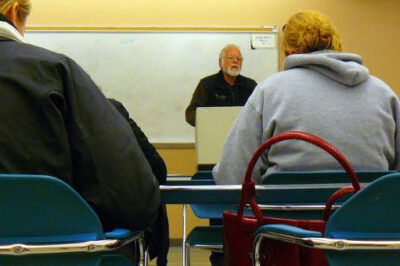Despite the fact that it may be possible, at least in some ways, to square the Bible’s account of creation with the teachings of Charles Darwin, there are at least three major problems with the theory of evolution:
1. It cannot explain how life began. While Darwin’s theory of evolution may seem logical, it never explains how the chasm between non-life and life was bridged.
2. It does not take into account the Bible’s clear teaching that the creation of human beings was a special, separate act. The Bible tells us that Adam and Eve did not gradually appear, over time, as the world evolved. Rather God took special care to create mankind in His own image: He “breathed into his nostrils the breath of life” (Gen. 2:7b).
3. Evolution cannot answer another most intriguing question: Where did consciousness come from?
It is one thing to believe that a rudimentary form of life came from inanimate objects—from rocks, water, air, fire and so forth—but how did that “life” begin to think? Physical changes are one thing. The ability to think and reason is another matter entirely. This is where the real mystery begins.
If we are merely machines controlled by our brains, where did our emotions come from? How did we learn to love our parents, our spouses, our children and our friends? How did we come to understand the difference between right and wrong, and why do we get a guilty conscience when we do something we know we should not do? Who or what told us we should not do it?
John Polkinghorne, who is both a theoretical physicist and Anglican priest, uses music to explain the difference between mere biological life and something deeper that goes to the core of who we are as human beings:
The poverty of an objectivist account is made only too clear when we consider the mystery of music. From a scientific point of view, it is nothing but vibrations in the air, impinging on the eardrums and stimulating neural currents in the brain.
How does it come about that this banal sequence of temporal activity has the power to speak to our hearts of an eternal beauty? The whole range of subjective experience, from perceiving a patch of pink to being enthralled by a performance of the Mass in B Minor and on to the mystic’s encounter with the ineffable reality of the One; all these truly human experiences are at the center of our encounter with reality, and they are not to be dismissed as epiphenomenal froth on the surface of a universe whose true nature is impersonal and lifeless.
Antony Flew invites his readers to imagine a marble table and asks,
Do you think that given a trillion years or infinite time, this table could suddenly or gradually become conscious, aware of its surroundings, aware of its identity the same way you are? It is simply inconceivable that this would or could happen.
And the same goes for any kind of matter. Once you understand the nature of matter, of mass-energy, you realize that by its very nature, it could never become “aware,” never “think,” never say, “I.” But the atheist position is that, at some point in the history of the universe, the impossible and the inconceivable took place. … Returning to our table, we see why this is simply laughable.
Charles Darwin himself admitted that he was challenged by the extreme difficulty, or rather the impossibility of conceiving of this immense and wonderful universe, including man, with his capacity for looking far backward and far into futurity, as the result of blind chance or necessity. When thus reflecting, I feel compelled to look to a First Cause having an intelligent mind in some degree analogous to that of a man, and I deserve to be called a theist.
In my book A Rabbi Looks at the Afterlife, I wrote about the philosopher John Locke, who asked what would happen if a prince and a cobbler suddenly exchanged consciousnesses one night while they were sleeping. When they woke up the next morning, would they be the men they were when they first went to sleep?
The answer is yes; they would have the same bodies they had before. But would they be the same person? No—because each would now have the memories and consciousness of the other.
Personal identity, Locke argues, is not the same as having the same physical substance. There is something more that makes us who we truly are. {eoa}
The preceding was excerpted from Jonathan Bernis’ book, A Rabbi Looks at the Supernatural: A Revealing Look at Angels, Demons, Miracles, Heaven and Hell. (Chosen Books, a division of Baker Publishing Group, copyright 2016, used by permission.
Jonathan Bernis (jewishvoice.org) is president and CEO of Jewish Voice Ministries International (JVMI) and has been a leader in Messianic Jewish ministry for more than thirty years. He hosts JVMI’s syndicated television show, Jewish Voice with Jonathan Bernis, aired in nations throughout the world. JVMI’s mission is to proclaim the gospel to the Jew first and also to the nations, according to Romans 1:16. He is a sought-after speaker at conferences and seminars and has authored numerous books, such as his A Rabbi Looks at … series.







Leave a Comment
You must be logged in to post a comment.